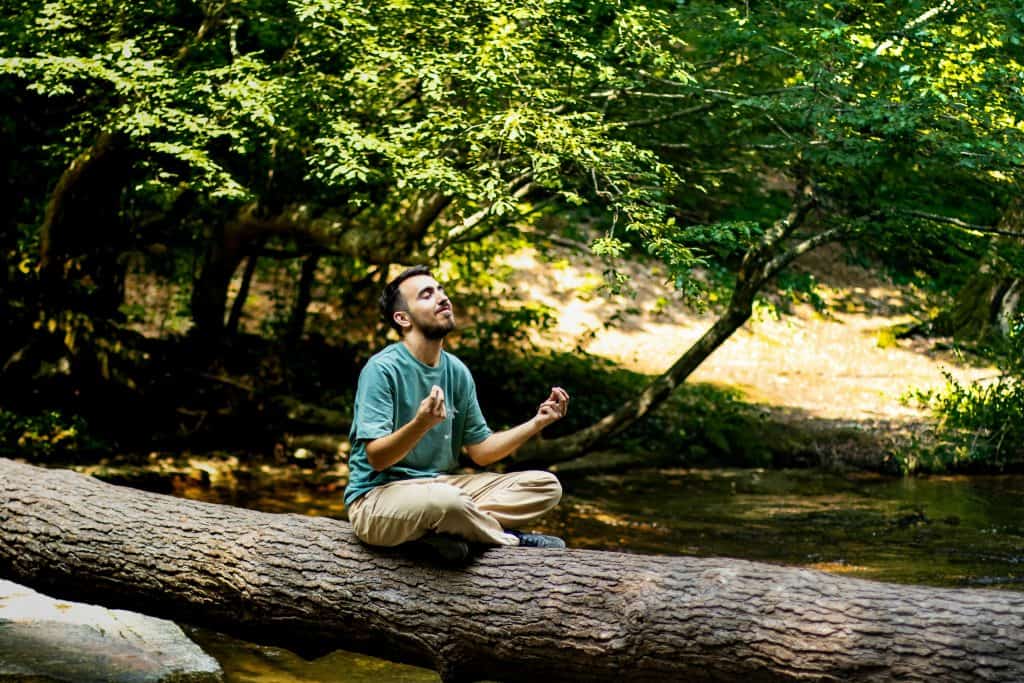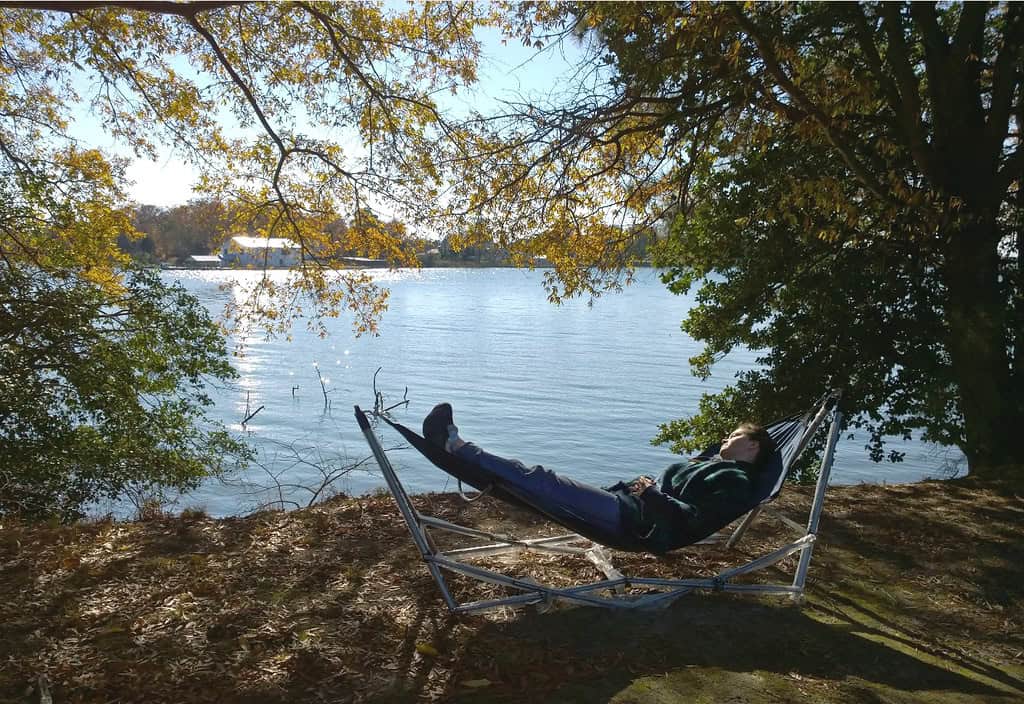Nature therapy begins with small, everyday choices—stepping outside, breathing deeply, and letting the natural world gently guide you back to balance. It’s about easing stress, and rediscovering your connection to the green earth’s calming rhythms.

Nature therapy is fast gaining recognition as a powerful remedy for the stress and anxiety brought on by our fast-paced, screen-saturated lives. As more people find themselves disconnected from the natural world, a growing body of scientific research, expert opinion, and personal experience highlights how simply spending time in nature can deeply restore both mental clarity and physical health.
In fact, recent studies are beginning to uncover how nature doesn’t just soothe the mind—it actively rewires it. A 2023 study from Stanford University used brain imaging to reveal that participants who walked for 90 minutes in a natural environment showed decreased activity in the subgenual prefrontal cortex, a brain region linked to rumination and negative thought patterns. In contrast, those who walked in urban settings showed no such reduction. This neurological evidence suggests that nature therapy may play a role in interrupting harmful mental loops, offering not just emotional relief but also measurable changes in brain function that support long-term mental well-being.
Wake Up to the Healing Power of Nature
A study published in Frontiers in Psychology explored how spending time in nature affects stress hormone levels. Over the course of eight weeks, 36 city dwellers were asked to spend at least 10 minutes, three times a week, in an outdoor space where they felt a connection to nature.
To track changes in stress, participants submitted saliva samples before and after each nature session to measure cortisol levels. The results showed that the most significant drop in cortisol occurred when individuals spent 20 to 30 minutes in a natural environment, whether sitting or walking. While benefits continued beyond 30 minutes, the rate of stress reduction slowed. These findings provide strong evidence for healthcare professionals to consider prescribing “nature pills” — short, intentional nature breaks — as a simple and cost-effective strategy to help reduce stress in urban populations.
Further supporting the benefits of nature exposure, a 2022 study conducted by the University of Exeter and published in Scientific Reports found that spending at least 120 minutes per week in nature is associated with significantly better health and well-being. Interestingly, it didn’t matter whether the 120 minutes were achieved in a single visit or spread across several shorter ones—what mattered was the total duration. Participants reported higher levels of life satisfaction, reduced feelings of loneliness, and improved mood, regardless of age, gender, or socioeconomic status. These insights further validate the therapeutic value of nature and reinforce the importance of weaving regular outdoor time into our busy urban lives.
The Urban Oasis: Balcony Bliss
For those struggling with high stress and poor sleep, you can create a morning ritual of sitting on your balcony, sipping herbal tea, and listening to birds. Within weeks, you will notice reduced anxiety and increased focus at work. Make this nature therapy practice a part of your daily life.
Recent findings from the University of Illinois further strengthen the case for such mindful nature rituals. Researchers discovered that individuals who spent time in green spaces during the early hours of the day experienced better sleep quality and improved circadian rhythm alignment. Exposure to natural morning light and ambient outdoor sounds—like rustling leaves or birdsong—was shown to enhance melatonin regulation, helping the body wind down more effectively at night. This simple act of beginning the day in nature doesn’t just set a calm tone—it also supports deeper, more restorative sleep, which in turn boosts emotional resilience and cognitive function.
Let Nature Guide Your Breath
Harvard research has extensively highlighted the benefits of deep breathing techniques, especially in reducing stress and improving emotional balance. Just a few minutes of slow, mindful breathing each day can help lower blood pressure—sometimes reducing systolic readings by as much as 10 points. Research from Harvard Medical School confirms that deep breathing in nature lowers blood pressure and improves emotional regulation. Although direct studies combining deep breathing with nature exposure are limited, both practices independently offer powerful health benefits and are central to nature therapy.
Take, for example, Japan’s approach to “Forest Breathing.” In Tokyo, many executives spend their lunch breaks in small city parks, practicing deep breathing exercises. The result? Sharper decision-making, reduced stress, and a noticeably better mood for the rest of the day.
The Art of Living Foundation in India promotes nature therapy programmes focussing on mindful breathing through outdoor yoga retreats, helping thousands experience the benefits of nature-assisted breathwork.
Unplug and Reconnect with Nature
Research from the University of California, Irvine, reveals the powerful cognitive boost that comes from spending time in nature. Gloria Mark, Chancellor’s Professor of Informatics at UCI, notes that just 20 minutes in a natural setting can significantly reduce stress and spark creative thinking.
Integrating short nature breaks into your daily routine offers an effective form of nature therapy—helping to refresh the mind, enhance creativity, and support overall cognitive performance.
Digital Detox in Himachal Pradesh: Reconnect with yourself on a tech-free weekend in Himachal Pradesh. Trek through lush forests, meditate in the tranquillity of the mountains, and return feeling focused, recharged, and mentally clear. Make it a habit—schedule weekly hours to unplug and let nature do the healing.

Green Your Space, Calm Your Mind
A NASA Clean Air Study found that houseplants improve indoor air quality, reducing stress and enhancing focus.
The study explored the role of houseplants in improving indoor air quality by filtering out harmful volatile organic compounds (VOCs) such as benzene, formaldehyde, and trichloroethylene.
But the benefits go far beyond cleaner air. Research has consistently shown that indoor plants can significantly reduce both physiological and psychological stress—lowering activity in the sympathetic nervous system and decreasing diastolic blood pressure. Their presence also boosts concentration, productivity, and overall mental well-being, making them a simple yet powerful form of nature therapy.
Urban Gardens in Bengaluru: In India’s Garden City, community green spaces are helping residents reconnect with nature. Even a modest balcony can be transformed into a vegetable patch, offering not just fresh produce but a daily escape from stress.
Rooftop Farming Trends: Across cities like Mumbai, Delhi, and Chennai, rooftop farming is becoming a popular movement. It’s not just about growing food—it’s about cultivating a deeper, more mindful connection with nature in the heart of the urban jungle.
Touch, Taste, Listen: Nature’s Therapy
A thematic analysis published in Frontiers in Psychology explores the various ways nature engagement supports mental health, identifying sensory experiences—like sights, sounds, and scents of nature—as a central factor in promoting emotional well-being.
The study suggests that sensory experiences in natural environments—such as sights, sounds, and smells—can reduce anxiety by fulfilling an innate human desire for such stimuli. This aligns with the biophilia hypothesis, which proposes that humans have an inherent affinity for nature. Additionally, exposure to nature has been linked to improvements in cognitive performance, including working memory and cognitive flexibility.
These cognitive benefits are often attributed to Attention Restoration Theory, which posits that natural environments engage effortless attention, allowing directed attention capacities to replenish.
Madhubani Art Therapy, Bihar: Artists in rural Bihar engage deeply with nature by using natural dyes and painting on handmade paper, inspired by trees, rivers, and animals. Studies show that this tactile connection to nature lowers stress and increases creativity.
The Healing Power of Trees
Japanese research published in Environmental Health and Preventive Medicine confirms that forest bathing—known as Shinrin-yoku—can significantly reduce heart rate and stress levels. The study, conducted on 280 participants across 24 forest sites in Japan, found that time spent in forest environments led to lower blood pressure, decreased cortisol levels, and a slower heart rate—all key indicators of reduced stress.
Moreover, participants showed increased parasympathetic nerve activity, which is associated with a state of deep relaxation. These findings reinforce the powerful role of forest bathing in supporting cardiovascular health and emotional well-being.
Forest Retreats in India: Across India, nature therapy retreats are embracing the concept of forest bathing, offering guests an opportunity to disconnect from urban chaos and reconnect with the natural world.
Jim Corbett National Park – A Silent Healing Retreat: In this tranquil Himalayan forest, guests are invited to experience Shinrin-yoku by walking barefoot on soft earth, breathing in the fresh woodland air, and being fully present in the moment. The retreat offers a path to emotional healing and renewal through the quiet wisdom of the forest.
Camp or Stay Off-Grid for a Weekend
A PNAS (Proceedings of the National Academy of Sciences) study found that time spent camping resets circadian rhythms, improving sleep patterns. A study published in Current Biology investigated the impact of natural light exposure on human circadian rhythms and sleep patterns.
Participants who spent a weekend camping without artificial light sources experienced a significant shift in their internal biological night to align more closely with sunset and sunrise. These benefits of nature therapy led to earlier sleep onset and improved sleep quality, demonstrating that exposure to natural light-dark cycles can effectively reset circadian rhythms and enhance sleep patterns.
The Wilderness Reset: If you feel drained by the pressures of daily life, a wilderness therapy backpacking trip might be the perfect escape. Trek through remote trails, set up camp under the stars, and let the simplicity of nature quiet your mind. The physical challenge of hiking, combined with the solitude of the wild, fosters resilience and clarity. Without digital distractions, you’ll reconnect with yourself and those around you, returning home with a renewed sense of calm and purpose.
Great Escapes
The Spiti Valley Escape: If you are overwhelmed by corporate stress, spend a week camping in Spiti Valley, Himachal Pradesh. With no Wi-Fi and only natural surroundings, you will feel deeply rested, with improved focus upon returning to work.
The Coorg Forest Retreat offers a peaceful escape in the Western Ghats of Karnataka, where mornings begin with walks through misty coffee plantations and evenings are spent listening to the rustle of the forest. With clean air, natural trails, and a gentle pace of life, Coorg helps calm the nervous system and reduce anxiety naturally.
The Sikkim Silence Stay, in villages like Dzongu or Yuksom, provides a deeply restorative atmosphere surrounded by alpine forests, waterfalls, and mountain breezes. The absence of noise pollution and the presence of sacred spaces encourage mindfulness, emotional balance, and uninterrupted sleep.
The Wayanad Green Pause invites you into Kerala’s forested highlands where spice-scented air, treehouse stays, and gentle treks to waterfalls create the perfect conditions for natural healing. Practising yoga or simply sitting in silence amid nature helps regulate breathing and reset mental fatigue.
The Nubra Valley Reset in Ladakh is ideal for those seeking stillness in the raw beauty of a high-altitude desert. With no digital distractions, you can reconnect with your breath and sleep under the stars, giving your mind a rare chance to unwind and recover.
The Araku Valley Breather in Andhra Pradesh is a quiet haven filled with tribal culture, green hills, and coffee plantations. Time here slows down as you explore nature trails, local crafts, and sun-drenched landscapes, offering a gentle yet effective path to inner clarity and reduced stress.
When Nature Becomes You
Reconnecting with nature doesn’t demand grand gestures—it begins with small, intentional shifts in how we relate to the world around us. It could be as simple as nurturing a potted plant, taking a silent walk through a nearby park, or unplugging for a weekend retreat in the forest. These moments of nature therapy ground us, calm us, and remind us of our place in the larger rhythm of life.
In choosing nature—however quietly—you choose healing, clarity, and a return to balance. Because sometimes, all it takes is a breath of fresh air or the rustle of leaves to begin feeling whole again.
Read more – Latest



